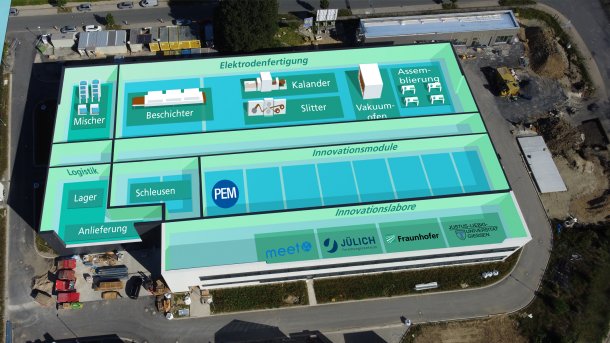Germany's Ministry opens first phase of "Battery Cell Research Production"
The Ministry of Research wants a better battery value chain and is opening the first construction phase of the "Battery Cell Research Production".

(Bild: Fraunhofer-Einrichtung Forschungsfertigung Batteriezelle FFBF)
The Federal Ministry of Education and Research (BMBF) has opened the first of two construction phases of the "FFB PreFAB" battery cell research production facility in Münster – an "open battery cell factory for research and development purposes". This marks the start of research operations at the "Fraunhofer Research Facility for Battery Cell Production FFB" on approximately 6,450 square meters of research space. The BMBF is funding the construction "with up to 500 million euros", according to Federal Research Ministry Bettina Stark-Watzinger on the occasion of the opening. The aim is to build a bridge between research and industry. The FFB will provide the research infrastructure in which industry can test the production of new battery technologies. The FFB will also train the necessary specialists.
"Battery technology is an important key technology of the future. That's why we are building the battery cell production of tomorrow on a large scale in Münster," says Stark-Watzinger. "The FFB Münster will make a key contribution far beyond North Rhine-Westphalia to ensuring that we remain a strong industrial location with secure, good jobs in the future and can achieve our ambitious climate protection goals. The opening of the FFB PreFab – just two years after the ground-breaking ceremony - is an important step in this direction," added North Rhine-Westphalia's Minister President Hendrik Wüst.
Growing demand for batteries
The demand for battery cells is increasing, particularly due to the mobility and energy transition. For this reason, the ministry is focusing on establishing a "technologically sovereign, competitive and sustainable battery value chain in and for Germany and Europe" with its umbrella concept for battery research. The concept ranges from basic research to industrial application and production. The focus is on material and component development, production technology, recycling, digitalization and scaling research. To this end, the existing umbrella concept "Battery Research Factory" has been further developed and will focus more strongly "on the efficient transfer of research results into industrial application".
For example, batteries for electric cars have to meet different criteria to those for cordless screwdrivers or smartphones, explains the ministry. Various questions therefore play a role in the project, such as the temperatures at which the batteries are to be used and the form in which they are stressed. According to the BMBF, the battery cell is "the smallest unit that determines the properties".
"While batteries have so far mainly come from the Far East, it is now important to become more independent in the key technology of batteries," writes the BMBF in a press release. In addition to having its own machines and production facilities for batteries and their components, this also requires a "broad and secure raw materials base [...] to avoid unwanted European dependencies". Lithium-ion systems and alternative battery systems are also being investigated within the umbrella concept.
The aim is to create the technological and scientific basis for "gigafactories" in Germany and Europe that will "still define the state of the art in 10 or 20 years' time". Science and industry are to cooperate nationally and internationally, with small and medium-sized enterprises also playing a role. Research institutions such as the FFB play a key role in this.
(mack)